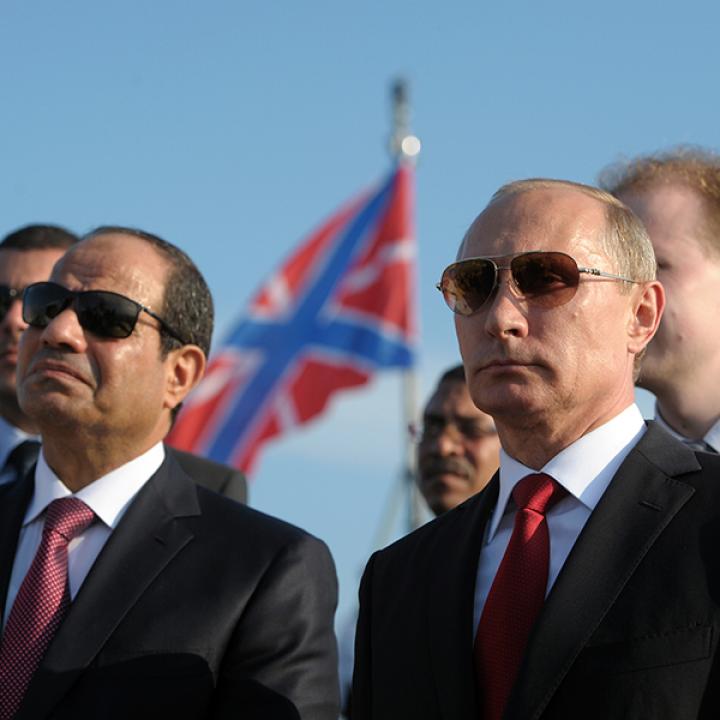
- Policy Analysis
- Policy Alert
UN Session on GERD Dispute Strains Egypt-Russia Relations

Moscow is keen on courting Ethiopia, and Cairo is beginning to realize its partner’s limitations, yet the two governments will nevertheless continue cooperating on hot-button issues like weapons procurement.
On August 5, Russian ambassador Georgiy Borisenko appeared on Egypt’s Ten TV to respond to local media campaigns against his country. Much of the criticism has stemmed from Moscow’s unfriendly stance toward Cairo during last month’s UN Security Council deliberations on the Grand Ethiopian Renaissance Dam (GERD). Amid the strongest bilateral tensions seen in years, Borisenko emphasized four points:
- That Russia will pursue a balanced policy regarding the GERD and will mediate disagreements between its allies in Cairo and Addis Ababa if asked.
- That Moscow deeply appreciates its military cooperation with Egypt but is concerned about the country’s participation in a June military exercise in the Black Sea region alongside the United States and Ukraine.
- That Russia still views the Egyptian-hosted East Mediterranean Gas Forum as an energy competitor but will consider joining as an observer.
- That the “terrorist” Muslim Brotherhood media based in London is responsible for spreading false rumors about strained bilateral relations.
The tensions first came to light on July 8, when Russian representative Vasily Nebenzya told the Security Council that diplomatic means are the only solution for disputes surrounding the GERD, and that “statements about using force should be avoided and prevented.” This line was interpreted negatively in Cairo because it directly challenged statements from President Abdul Fattah al-Sisi, who had been insinuating for months that a military confrontation was possible. The situation grew more heated on July 12, when Moscow and Addis Ababa signed a military agreement on the same day that Egypt sent its foreign minister to Brussels to meet with NATO officials.
Cairo’s expectations of full Russian support on the GERD dispute stems from its perceived alignment with a multitude of Russian objectives in the Middle East. Egyptian officials have stood by Moscow in international forums, adopted hostile positions against Western-style NGOs, supported the Assad regime in Syria, tolerated the presence of Russia’s Wagner mercenaries in Libya, taken an aggressive stance against political Islamists, and increased their procurement of Russian weapons to levels not seen since the 1960s. Cairo also permitted Russia to open a consulate in the Red Sea city of Hurghada in 2016. More recently, Egypt has been trying to lure Russian investment in economic projects around the Suez Canal.
Moscow’s GERD stance has made Cairo fear it is being taken for granted despite all of the above, leading some in Egyptian policy circles to suspect that Russia will demand even more concessions before offering fuller support at the UN. Apparently, Sisi’s camp is unwilling to stomach further concessions—or is unable to provide them in some cases. A July 10 essay by the Center for Arab-Eurasian Studies speculated that Moscow may not take Cairo’s complaints or ambitions too seriously because it believes the country’s regional influence is lacking—as demonstrated, for instance, when Egyptian officials did not get Syria readmitted into the Arab League. The question is how much this disrespect (if real) actually affects Russian policy toward Cairo.
Whatever the case, many pro-government intellectuals in Egypt have responded to this bilateral disconnect by penning articles and social media posts arguing that the Russia of today is not the USSR of the 1960s, and that Cairo must therefore keep the United States as an additional partner. In an article titled “Those Who Let Us Down in the Security Council,” Nasserist parliamentarian Emad El-Din Hussein—the editor-in-chief of al-Shorouk newspaper—expressed his appreciation for Washington’s “unexpected” sympathetic stance on the GERD dispute and questioned Russia and China’s attitude. Political scientist Emad Gad went further, arguing on Facebook that Cairo should cancel its Dabaa nuclear reactor agreement with Moscow and sign a new one with Washington in order to gain fuller support on dam-related issues. Political researcher Amr El-Shobaki likewise noted the relatively supportive GERD positions taken by the United States and Europe, arguing that those who call for an alliance with Russia and China are doing so because those governments do not push for democratization or human rights.
Policy Implications
In the near term, Egyptian-Russian tensions will likely persist over the GERD. Russia will presumably continue courting Ethiopia in the hope of gaining a foothold in the Horn of Africa, and this is unlikely to please Cairo. Yet their cooperation on the Dabaa nuclear project and COVID-19 vaccine production will probably endure. Most important for U.S. policy, the Egyptian camp that has long romanticized the Soviet support of the 1960s is now facing blowback. Recent events have led many observers to see today’s Russia for what it is: technologically backward, cash strapped, and under heavy Western sanctions.
Yet despite this boost to America’s position in Cairo, Washington should not let itself be dragged into a heated competition over Egypt’s favor. Cairo loves using bidding wars between great powers to extract concessions from both sides. In the end, Cairo will continue buying Russian weapons to lessen its dependence on Washington, and Moscow’s lenient position on human rights will remain a bright spot for Sisi’s government.
Haisam Hassanein is a Middle East analyst and a former Glazer Fellow with The Washington Institute.



